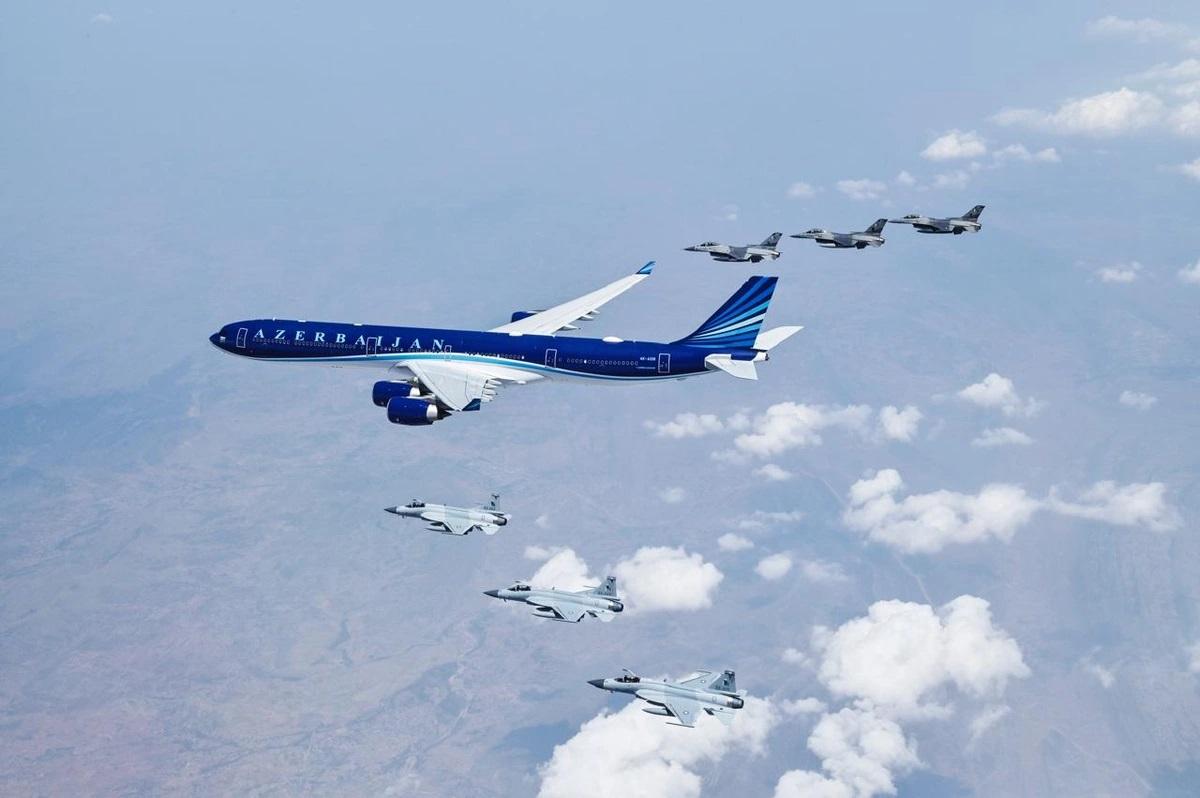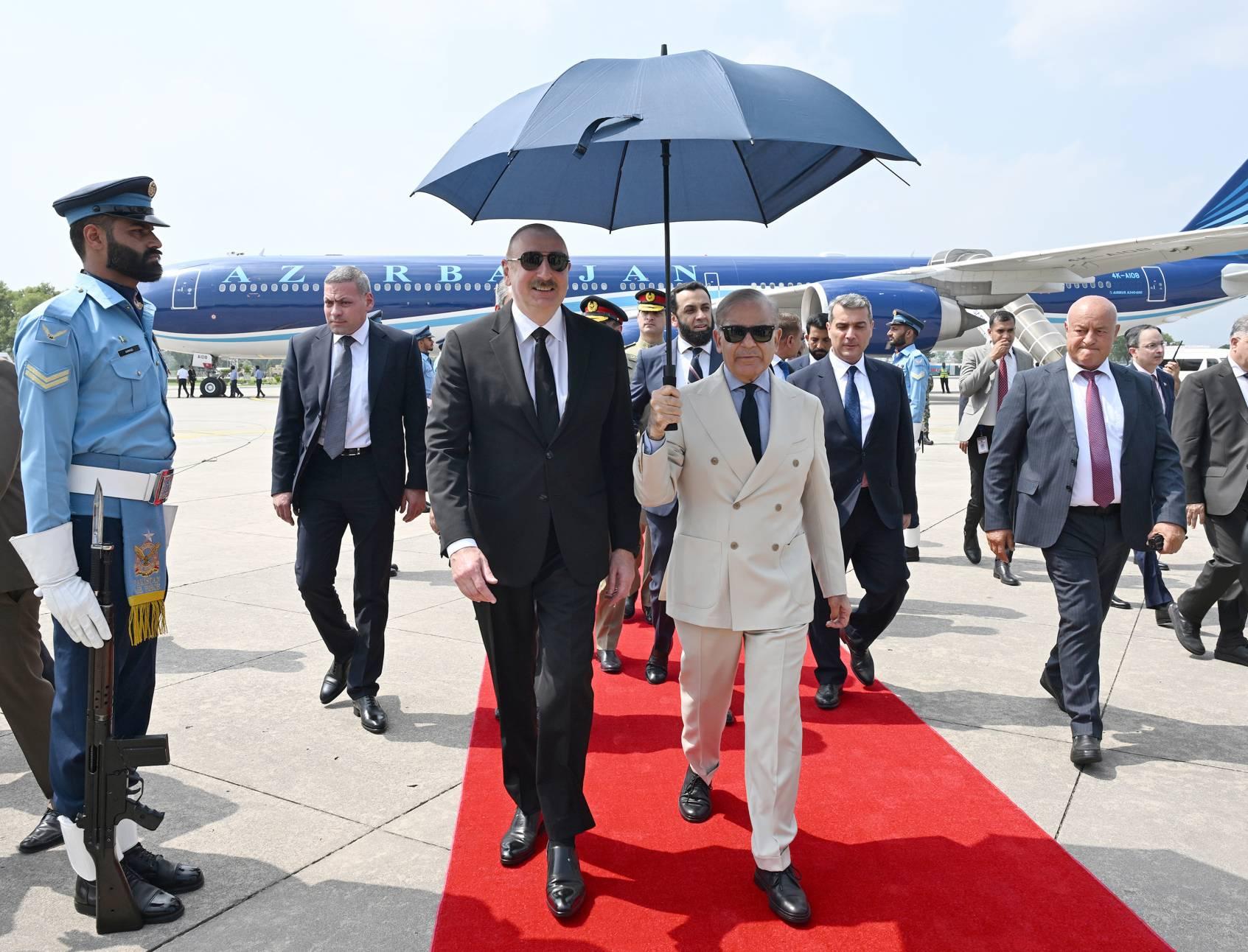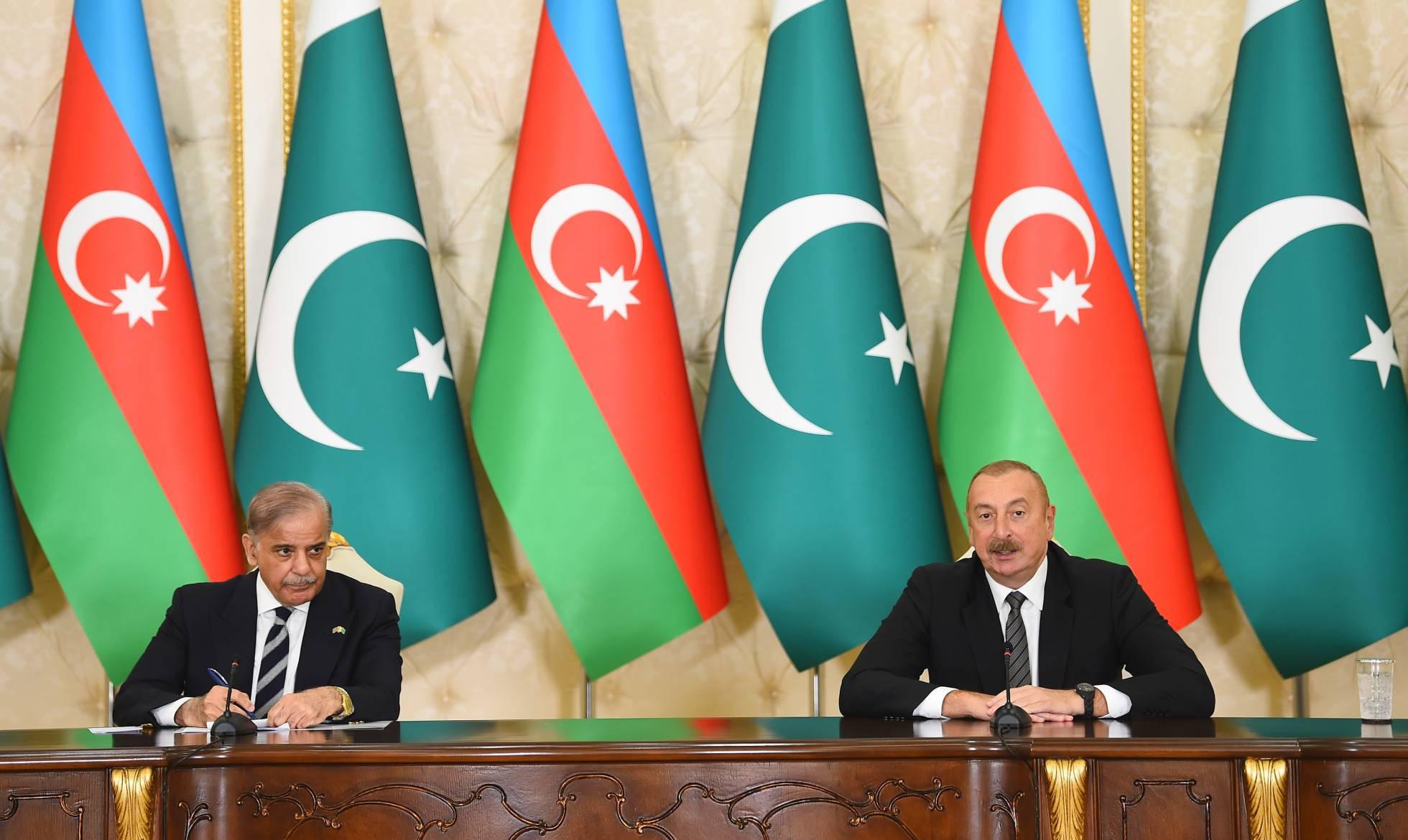Azerbaijan, Pakistan forge stronger bonds Article by Foreign Policy in Focus
The website of the American think tank Foreign Policy in Focus (FPIF) published an article by Tarique Niazi on Azerbaijani-Pakistani relations. Caliber.Az reprints the article.
It is very rare that a leader from the southern Caucasus treks to a south Asian nation on business. But a blooming bromance between Azerbaijan and Pakistan has made this rarity routine. On July 11-12, President Ilham Aliyev of Azerbaijan landed in Islamabad on what Pakistan described a “state visit.” He received the protocol that Islamabad reserves for dignitaries from the United States and the People’s Republic of China. A pair of Pakistan’s sleek fighter jets escorted the presidential plane as soon as it entered the country’s airspace. While flanking him, the pilot of a Pakistani jet dived close to the president’s aircraft to greet him with a military salute.

As if this were not enough, Pakistan’s Prime Minister Shehbaz Sharif was waiting “in person” to receive Aliyev at a Pakistan Airforce Base in Islamabad. As the Pakistani president emerged from the plane, Sharif stretched his arms wide to embrace him. They had three customary bear hugs, before they walked to the VVIP (Very, Very Important Person) lounge. The prime minister Sharif held a big umbrella that shaded them both against the blistering sun and the temperature over 10o degrees. Summers in Islamabad are unusually cooler and winters milder. But climate change has turned the natural order of things upside down.
President Aliyev has been to Pakistan before, but not on a state visit. He was in Islamabad in 2017 to attend the annual summit of the Economic Cooperation Organization (ECO), a 10-member regional alliance with its headquarters in Tehran, Iran. Only a week ago, he met with Prime Minister Sharif at the Shanghai Cooperation Organization’s (SCO) summit that was held in Astana, Kazakhstan. Azerbaijan is a dialogue partner of the SCO.
In 2017, Azerbaijan, Pakistan, and Türkiye formed a Trilateral Summit Forum that meets yearly, most recently this month in Astana. One of the major features of this forum is defence and security cooperation. The three nations hold joint military exercises, like the one held in 2021 affectionately dubbed “Three Brothers.” Pakistan offered “political support” to Azerbaijan to help resolve its 30-year-old conflict with Armenia over the Nagorno-Karabakh region.
How effective is this alphabet soup of regional organizations? If you are Armenian, none at all. Armenia is a member of the Russia-led Collective Security Treaty Organization (CSTO) comprising six post-Soviet states. The treaty’s Article 4 echoes NATO in proclaiming “aggression against one is aggression against all.” When Azerbaijan and Armenia fought over the disputed territory of Nagorno-Karabakh, neither Russia nor the CSTO lifted a finger to help disengage the parties, save tens of thousands of lives, or spare the dislocation of hundreds of thousands of Azeris and Armenian-Azeris.

Bilateral and trilateral cooperation is, nevertheless, stronger than multilateral economic or security forums. Azerbaijan, Pakistan, and Türkiye are now working on building a transit corridor to connect Asia with Europe. While Pakistan solidly sits in Asia, Azerbaijan and Türkiye straddle the continents of Asia and Europe, which puts them in a unique geoeconomic position. Pakistan wants to take advantage of this route to get its trade goods to Europe and to the United States (the latter is Islamabad’s largest export market).
When it comes to bilateral trade, the frequency and the high level of contacts between Azerbaijan and Pakistan do not reflect the density of their diplomatic relations. Their trade volume is as low as$37 million, while, at $100 million, bilateral investment also falls short of their soaring aspirations. Baku and Islamabad are now in talks to sign the Preferential Trade Agreement (PTA) and the Transit Trade pact, which would allow them to trade goods without tariffs. Azerbaijan already imports Pakistani rice duty-free.
To make amends, President Aliyev vowed to up his country’s investment in Pakistan to $2 billion. Investment, not trade, is the true measure of the depth of relations between any two countries. Azerbaijan is undoubtedly eager to elevate its economic relations with Pakistan. But there are stark disparities between the two that constrain this ambition.
Azerbaijan’s population of 10.4 million is a fraction of Pakistan’s 245 million, which offers a much smaller market for Pakistani goods. On the other hand, Azerbaijan is an upper-middle income country with a per capita GDP of almost $8,000 compared to Pakistan’s $1,650, which leaves Islamabad with much less buying power for Azeri goods, including travel, tourism, education, and healthcare. Similarly, in contrast to Pakistan’s diverse economic portfolio, Azerbaijan’s economy is driven by natural resources, especially oil and natural gas that account for 95 per cent of its exports and 75 per cent of its revenue. Yet, with 7 billion barrels of oil and 2.5 trillion cubic meters of proven natural gas reserves, Azerbaijan’s resource bank is hardly inexhaustible.
Yet Azerbaijan and Pakistan take pride in their unity of views on regional and global affairs. Sharif congratulated Aliyev on assuming the presidency of COP 29, the annual UN Climate Summit. He hoped that the event would voice concerns of the developing world, especially those of Pakistan, which ranks among nations most vulnerable to climate change. In 2022, Pakistan was hit by monsoon-swelled floods that forced one-third of the country under water, affecting 33 million people, while killing and wounding in the thousands. Pakistan’s agrarian economy was devastated, costing Pakistan $40 billion in losses. This climate-induced calamity was showcased at COP27 in Cairo, where Pakistan fought hard to have the summit resolve the decades-old issue of financing “loss and damage” suffered by developing countries from climate change.
Then U.S. Special Presidential Envoy for Climate John Kerry, after initial resistance, helped birth a breakthrough agreement on the issue. Funding from a new Loss and Damage Fund means that a country like Pakistan should get every single penny of its $40 billion reimbursed. But such a lofty goal is light years away from actual funding. At COP 27, the pledges made to fund to the new fund were laughably low at only $230 million. At the same summit, delegates were told that a transition to a global low-carbon economy will cost $4-6 trillion a year. Azerbaijan’s minister for ecology and natural resources, who is president-designate of COP29, in a letter to summit delegates, clearly stated that a “New Collective Quantified Goal” on climate finance would be the summit’s top priority.

Climate finance is the commitment of rich countries to pay $100 billion a year to help developing countries mitigate and adapt to climate change. Despite this financial commitment since 2009, actual contributions have not been made until now. Azerbaijan’s minister of ecology and natural resources, in his letter, offered the good news that the rich countries had contributed $115 billion in 2022 ($15 billion in excess of their promised annual commitment) for public climate finance. In fact, this figure has been massaged so much that it strains credulity. “The OECD (Organization of Economic Cooperation and Development) reports that in 2022, as in previous years, public climate finance mainly took the form of loans, which accounted for 69% of the contributions.” Some of these loans were made at market rates.
The climate summit in Baku is, however, a monumental event that will attract close to 200 heads of government and state, raising Azerbaijan’s profile. Most Azeris, however, will be on the lookout for the U.S. president and the Armenian prime minister. Both are unlikely to attend. Joe Biden skipped COP28 in Dubai and is likely to skip COP29 in Azerbaijan in November. Yet his commitment to mitigating climate change remains undiminished.
With the departure of Kerry from his envoy position, COP 29 will doubly miss U.S. leadership. Kerry’s larger-than-life presence at climate summits assured the world of the U.S. determination to stabilize the climate. The prospect of Donald Trump returning to the White House is also of concern to environmental advocates. In his first term, Trump pulled the United States from the Paris Climate Pact and stopped contributing to climate finance. His second term may prove a Category-5 hurricane for the climate pact and climate stability. The U.S. election, which will take place only a week before COP29, will be much on the minds of those who gather in Baku.








